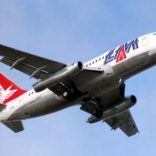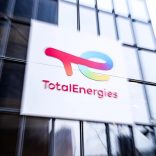Mozambique: Workers demand higher wages on May Day
Mozambique: Delays to LNG revenues may mean further debt restructuring – analyst

FILE - For illustration purposes only. [File photo: Macauhub]
Mozambique may have to restructure its public debt if revenues from liquefied natural gas (LNG) do not ramp up quickly, according to a UK-based analyst at Capital Economics who follows the country’s economy.
“The TotalEnergies announcement about the resumption of work [on a major LNG project in the north] is extremely important for Mozambique’s gas ambitions and public finances, as further delays would be a negative development because of the country’s high level of public debt,” the analyst, David Omojomolo said in comments told Lusa.
“With debt payments increasing from 2024, a restructuring seems inevitable if gas revenues don’t increase quickly, and even then the risks of a Sovereign Default are likely to remain high,” he added.
At stake is the increase in payments on Mozambique’s sovereign debt bonds from next year, following the restructuring of debt owed by public enterprise Ematum that was converted into public debt following the ‘hidden debts’ scandal at the end of the last decade, and which has already undergone a change in terms, with the start of payments postponed in exchange for a higher interest rate.
According to an analysis by Standard & Poor’s last week, Mozambique will as a result see the cost of servicing bonds maturing in 2031 rise from an average 5% a year currently, or around $47 million (€44 million euros), to 9% from March 2024, representing an annual cost of $81 million (€76 million) between 2024 and 2028, before rising further to $225 million (€212 million) a year in amortisations between 2028 and 2031.
For Capital Economics, the return of TotalEnergies to work in the north of the country “is good news, despite the delay which implies that production and export of natural gas will only begin in 2028,” precisely when the cost of debt rises the most.
This, it concludes, means that any further delay will almost certainly imply a need to restructure the terms of debt payments to investors.
Mozambique has three development projects approved to exploit the natural gas reserves in the Rovuma basin, classified as one of the largest in the world, off the coast of the provinc eof Cabo Delgado.
Two of these projects are larger and involve channelling the gas from the seabed to land, cooling it in a plant to export it by sea in a liquid state.
One of these larger projects, in Palma district, is led by TotalEnergies (Area 1 consortium); work on it progressed until it was suspended indefinitely following an attack by armed rebels on Palma in March 2021, when the French energy company declared that it would only resume work when the area was safe.
The other is the still unannounced investment led by ExxonMobil and Eni (Area 4 consortium).
A third, completed but smaller project also belongs to the Area 4 consortium and consists of a floating platform to capture and process gas for export, directly at sea, which started up in November 2022.
This floating platform is expected to produce 3.4 million tonnes per annum (mtpa) of liquefied natural gas, Area 1 is aiming for 13.12 mtpa and the onshore plan for Area 4 envisages 15 mtpa.
Cabo Delgado province has been plagued by an armed insurgency for five years, with responsibility for some attacks claimed by a local affiliate of the extremist group Islamic State.
The insurgency has brought to a military response that since July 2021 has had support from Rwanda and the Southern African Development Community (SADC). This has succeeded in liberating districts near gas projects, but new waves of attacks have emerged to the south of the region and in neighbouring Nampula province.
The conflict has already displaced one million people, according to the United Nations High Commissioner for Refugees (UNHCR), and caused around 4,000 deaths, according to the ACLED conflict registration project.













Leave a Reply
Be the First to Comment!
You must be logged in to post a comment.
You must be logged in to post a comment.